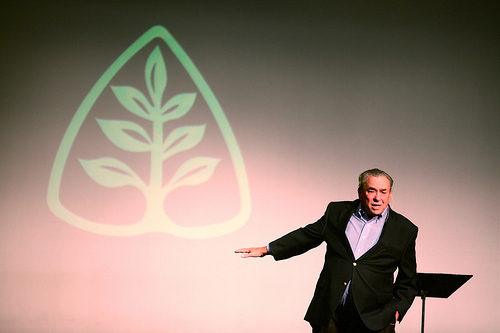R.C. Sproul's Blog, page 555
December 14, 2011
Great Quotes from Reason to Believe

I recently had the opportunity to read through almost all of the books of R.C. Sproul. Along the way I built a collection of some of the best quotes from each one of them. Here are several of the best from Reason to Believe.
Before miracles can be rejected out of hand as ipso facto impossible, the critic must first establish that we are living in a closed mechanistic universe in which there exists no possibility of divine or supernatural intrusion.
The Christian has nothing to fear from rigorous historical research. Rather, we have everything to gain.
The Old Testament, in spite of its manifestations of the wrath of God, remains a history of God’s grace and long-suffering with a rebellious people. There is wrath unparalleled in the New Testament and grace overwhelming in the Old Testament. A false dichotomy between the Testaments is foreign to the biblical writers themselves.
If man has in fact committed cosmic treason against God, what reason could we possibly have that God should provide any way of redemption? In light of the universal rebellion against God, the issue is not why is there only one way, but why is there any way at all? I know of no way of answering that question.
The innocent native who never hears of Christ is in excellent shape, and we need not be anxious about his redemption. The innocent person doesn’t need to hear of Christ. He has no need of redemption. God never punishes innocent people. The innocent person needs no Savior; he can save himself by his innocence.
For a Christian to be a Christian, he must first be a sinner. Being a sinner is a prerequisite for being a church member. The Christian church is one of the few organizations in the world that requires a public acknowledgement of sin as a condition for membership.
The suffering of the Christian or anyone else in this world is never ultimately an accident. All suffering is within the pale of divine sovereignty. All suffering comes within the broader context of the sovereignty of God.

December 13, 2011
Praying Friends
It is not an easy thing to discern where a given soul is headed. The elders of the local church are called with the task of determining the credibility of the professions of those under their care. Because we are all sinners, the presence of sin in a man’s life does not answer the question. Because we all profess Christ, the theological accuracy of ones grasp of the gospel does not answer the question. It is a sticky business indeed.
In our day we, as with every other day, suffer from syncretism, the blending together of the worship of the living God with the worship of the spirit of the age. There are many who profess the name of Christ, who in turn lie like, think like, feel like, hunger like their unbelieving neighbors. Will these prove to be skin-of-their-teeth Christians, or will they prove to be wolves amidst the flock?
Though by no means a cure-all for this challenge, one unexpected test may be found amidst the surfeit of wisdom found in James 5. Who are your friends? When you find yourself in need of aid, to whom do you turn? James tells us, "The effective, fervent prayer of a righteous man avails much" (verse 16). Now this certainly could be understood as yet another call to righteousness. Do you want your prayers to be effective, to avail much? Pursue righteousness.
That, however, has not been my perspective of late. In this great time of need that the Sproul family finds themselves in, I find myself giving thanks not only for my friends, but for the righteousness of my friends. I am forced to confess my own weakness as a righteous man. I am, however, blessed to confess that I have been blessed with righteous friends. We not only have, literally, thousands praying for us, but we have godly men and women praying for us. As I type my eldest is on the phone with Beall Phillips, a saintly woman and longtime friend of the family. Her prayers, according to James, availeth much, as do the prayers of her husband and children, all of whom manifest the righteousness of Christ in their loyal love to my family.
On my computer, as I type, the music of Nathan Clark George is playing. He too, along with his wife Patsy, are godly, and prayerful for me and mine. My mother, my father, my sister, the Steiman family, the Deweys, Windhams, Murphys, Hays, and dozens more families at Saint Peter Presbyterian in Virginia are praying prayers that availeth much. The saints at Saint Andrews here in Orlando, the saints at Heritage Covenant in Centreville, Tennessee, all of these are not just praying, but praying with power.
My desire here, however, is not merely to give thanks, but to encourage us all to pursue godly friends. Those who make friends with the world have only the world to pray for them. Those who love the saints, on the other hand, have those covered by the righteousness of Christ Himself praying on their behalf.
As the Sprouls move into what we expect to be the most difficult days of our lives, we know not only that we are not alone, not only that we are joined by thousands of pray-ers, but that we have righteous men and women lifting us up to and through the one Righteous Man, whose prayers are not for health and comfort, but that we would be conformed to His image. And His prayers availeth everything.

Rest for Restless Hearts
Stroll into a bookstore these days and you will likely find a large area labeled "Self-Help," "Motivation," or "Personal Transformation." Go ahead, browse the volumes found here. Some are curiously interesting, and some will just make you laugh. Several books will seek to convince you that your main problem in life is that you aren't tapped into the secret power that dwells inside of you. Something — a child, a serpent, a Buddha, and, yes, even a dolphin — simply needs to be "awakened," and then you will become happy, healthy, and wise.
Some of these titles are clearly aimed at a Christian, churchgoing market. Some are even written by professing believers. There is a disturbing similarity in emphasis between these books and those offered by various "enlightenment" groups. It makes you wonder whether the contemporary church has become so desperate for spiritual identity that she has turned to New Age ideology and pop psychology for help. Various teachers and authors seek to convince us that our cosmic purpose is found within ourselves. Each promises that we can locate the telos — the ultimate aim — of our spiritual satisfaction within our own hearts. Of course, nothing could be further from the truth or more dangerous to our souls.
Continue reading Rest for Restless Hearts, Scott Anderson's contribution to the December issue of Tabletalk.

December 12, 2011
Cruise Alaska Next June with R.C. Sproul
 What better way to start off Summer 2012 than with a cruise to Alaska with R.C. Sproul and Ligonier Teaching Fellows Steven Lawson and R.C. Sproul Jr.?
What better way to start off Summer 2012 than with a cruise to Alaska with R.C. Sproul and Ligonier Teaching Fellows Steven Lawson and R.C. Sproul Jr.?
Consider joining us June 1-8, 2012, as we explore the beautiful coastlines of Alaska for a time of relaxation and renewal as we marvel at the majesty of God's creation and His divine providence.
We set sail from Seattle, Washington, to embark on a journey of awe and wonder. We will visit the ports of Ketchikan, Juneau, Skagway and Victoria,  British Columbia and view the amazing ice formations and wildlife in Tracy Arm Fjord and the Inside Passage.
British Columbia and view the amazing ice formations and wildlife in Tracy Arm Fjord and the Inside Passage.
Our study will be on the providential work of God in our lives. During our eight days together there will be plenty of opportunities for exploration, both natural and spiritual as we consider the wonder of God’s creation and the invisible hand that sustains it.
 As an added bonus, those who cruise with us are invited to extend their stay in Seattle and will receive complimentary registration to attend a post-cruise conference featuring Steven Lawson, John MacArthur, R.C. Sproul and others June 8-9, 2012 (more information coming soon).
As an added bonus, those who cruise with us are invited to extend their stay in Seattle and will receive complimentary registration to attend a post-cruise conference featuring Steven Lawson, John MacArthur, R.C. Sproul and others June 8-9, 2012 (more information coming soon).
P.S. This ship is filling up quickly. Suites and inside cabins tend to sell out first. For more information, visit Ligonier.org or call Ryan Dick at His Glory Tours, 877-977-2177.

Do You Believe in a Santa Christ?

In Sinclair Ferguson's book, In Christ Alone, he shares the sad reality that many Christians have a Christology that is more informed by Santa Claus than Scripture. For many, the message of the incarnation has been so twisted or diluted that they have in fact created for themselves a savior who is nothing more than a Santa Christ.
As you prayerfully read Ferguson's words, ask yourself the following question this Christmas season: "Do I believe in a Santa Christ?"
1. A Pelagian Jesus is a Santa Christ
Santa Christ is sometimes a Pelagian Jesus. Like Santa, he simply asks us whether we have been good. More exactly, since the assumption is that we are all naturally good, Santa Christ asks us whether we have been "good enough." So just as Christmas dinner is simply the better dinner we really deserve, Jesus becomes a kind of added bonus who makes a good life even better. He is not seen as the Savior of helpless sinners.
2. A Semi-Pelagian Jesus is a Santa Christ
Or Santa Christ may be a Semi-Pelagian Jesus -- a slightly more sophisticated Jesus who, Santa-like, gives gifts to those who have already done the best they could! Thus, Jesus' hand, like Santa's sack, opens only when we can give an upper-percentile answer to the none-too-weighty probe, "Have you done your best this year?" The only difference from medieval theology here is that we do not use its Latin phraseology: facere quod in se est (to do what one is capable of doing on one's own, or, in common parlance, "Heaven helps those who help themselves").
3. A Mystical Jesus is a Santa Christ
Then again, Santa Christ may be a mystical Jesus, who, like Santa Claus, is important because of the good experiences we have when we think about him, irrespective of his historical reality. It doesn't really matter whether the story is true or not; the important thing is the spirit of Santa Christ. For that matter, while it would spoil things to tell the children this, everyone can make up his or her own Santa Christ. As long as we have the right spirit of Santa Christ, all is well.
But Jesus is not to be identified with Santa Claus; worldly thinking — however much it employs Jesus-language — is not to be confused with biblical truth.
Who is the Biblical Christ of Christmas?
The Scriptures systematically strip away the veneer that covers the real truth of the Christmas story. Jesus did not come to add to our comforts. He did not come to help those who were already helping themselves or to fill life with more pleasant experiences. He came on a deliverance mission, to save sinners, and to do so He had to destroy the works of the Devil (Matt. 1:21; 1 John 3:8b).
Those whose lives were bound up with the events of the first Christmas did not find His coming an easy and pleasurable experience.
Mary and Joseph's lives were turned upside down.
The shepherds' night was frighteningly interrupted, and their futures potentially radically changed.
The magi faced all kinds of inconvenience and family separation.
Our Lord Himself, conceived before wedlock, born probably in a cave, would spend His early days as a refugee from the bloodthirsty and vindictive Herod (Matt. 2:13-21).
There is, therefore, an element in the Gospel narratives that stresses that the coming of Jesus is a disturbing event of the deepest proportions. It had to be thus, for He did not come merely to add something extra to life, but to deal with our spiritual insolvency and the debt of our sin. He was not conceived in the womb of Mary for those who have done their best, but for those who know that their best is "like filthy rags" (Isa. 64:6)--far from good enough--and that in their flesh there dwells no good thing (Rom. 7:18). He was not sent to be the source of good experiences, but to suffer the pangs of hell in order to be our Savior.
This excerpt has been adapted from Sinclair Ferguson's In Christ Alone which can be purchased from the Ligonier store.

December 11, 2011
Twitter Highlights (12/11/11)
Here are highlights from the various Ligonier Twitter feeds over the past week.
Atheism is a strange thing. Even the devils never fell into that vice (Charles Spurgeon).
— Tabletalk Magazine (@Tabletalk) December6, 2011
You have to stop thinking logically to argue that the universe came into being by itself, out of nothing. - R.C. Sproul
— Ligonier Ministries (@Ligonier) December6, 2011
All our sins of parenting can be washed away with the blood of Jesus Christ. -Joel Beeke bit.ly/njTRMB
— Reformation Trust (@RefTrust) December7, 2011
The Carolfest is always a highlight at our Christmas Gathering:@ Saint Andrew's Chapel instagr.am/p/YC6Rq/
— Ligonier Ministries (@Ligonier) December9, 2011
Monergistic regeneration is exclusively a divine act.Man does not have the creative power God has. - Dr. R.C. Sproul, President of RBC
— RefBibleCollege (@RefBibleCollege) December8, 2011
What fools are they who, for a drop of pleasure, drink a sea of wrath (Thomas Watson).
— Ligonier Academy (@LigonierAcademy) December9, 2011
Only God can provide us with an eternal perspective and speak to us with absolute and final authority. -@rcsproul bit.ly/sTvvnE
— Ligonier Connect (@LigonierConnect) December9, 2011
You can also find our various ministries on Facebook:
Ligonier Ministries | Ligonier Academy | Ligonier Connect
Reformation Bible College | Reformation Trust | Tabletalk Magazine

Accepting "No" as God's Will
I am astonished that, in the light of the clear biblical record, anyone would have the audacity to suggest that it is wrong for the afflicted in body or soul to couch their prayers for deliverance in terms of “If it be thy will….” We are told that when affliction comes, God always wills healing, that He has nothing to do with suffering, and that all we must do is claim the answer we seek by faith. We are exhorted to claim God’s yes before He speaks it.
Away with such distortions of biblical faith! They are conceived in the mind of the Tempter, who would seduce us into exchanging faith for magic. No amount of pious verbiage can transform such falsehood into sound doctrine. We must accept the fact that God sometimes says no. Sometimes He calls us to suffer and die even if we want to claim the contrary.
Never did a man pray more earnestly than Christ prayed in Gethsemane. Who will charge Jesus with failure to pray in faith? He put His request before the Father with sweat like blood: “Take this cup away from me.” This prayer was straightforward and without ambiguity—Jesus was crying out for relief. He asked for the horribly bitter cup to be removed. Every ounce of His humanity shrank from the cup. He begged the Father to relieve Him of His duty.
But God said no. The way of suffering was the Father’s plan. It was the Father’s will. The cross was not Satan’s idea. The passion of Christ was not the result of human contingency. It was not the accidental contrivance of Caiaphas, Herod, or Pilate. The cup was prepared, delivered, and administered by almighty God.
Jesus qualified His prayer: “If it is Your will….” Jesus did not “name it and claim it.” He knew His Father well enough to understand that it might not be His will to remove the cup. So the story does not end with the words, “And the Father repented of the evil He had planned, removed the cup, and Jesus lived happily ever after.” Such words border on blasphemy. The gospel is not a fairy tale. The Father would not negotiate the cup. Jesus was called to drink it to its last dregs. And He accepted it. “Nevertheless, not My will, but Yours, be done” (Luke 22:42).
This “nevertheless” was the supreme prayer of faith. The prayer of faith is not a demand that we place on God. It is not a presumption of a granted request. The authentic prayer of faith is one that models Jesus’ prayer. It is always uttered in a spirit of subordination. In all our prayers, we must let God be God. No one tells the Father what to do, not even the Son. Prayers are always to be requests made in humility and submission to the Father’s will.
The prayer of faith is a prayer of trust. The very essence of faith is trust. We trust that God knows what is best. The spirit of trust includes a willingness to do what the Father wants us to do. Christ embodied that kind of trust in Gethsemane. Though the text is not explicit, it is clear that Jesus left the garden with the Father’s answer to His plea. There was no cursing or bitterness. His meat and His drink were to do the Father’s will. Once the Father said no, it was settled. Jesus prepared Himself for the cross.
*****
Excerpt from Surprised by Suffering: The Role of Pain and Death in the Christian Life (Reformation Trust, 2009).

December 10, 2011
Doing Great Things
When we first learned that my little girl Shannon would always be a little girl, when we discovered about her first birthday that she was profoundly disabled, my father, a deeply compassionate man asked how I was handling the news. I told him that I had been preparing for this moment all my life. If anyone should be able to rest in the sovereignty of God it is me. The sovereignty of God is the cornerstone of Reformed theology, which theology I have been schooled in from my youth by one of its greatest living proponents.
The sovereignty of God, rightly understood, was the very core of my father's best known work, The Holiness of God. The doctrine came front and center in his next book, Chosen by God. I was a young man when those books were first published. Like many others I ate them up, drank them in, and like too many young men, spat out their wisdom with precious little grace and care. I reveled in God's sovereignty, and delighted in nothing more than to argue for, to defend, to proclaim that sovereignty.
That all changed, however, when I read still another book by my father, this one born of a family hardship. Surprised by Suffering begins with the still-born birth of my niece, Alissa. From there the book explores not just the truth that God ordains our suffering but why. The point that has stuck with me over the years was this- suffering isn't something that happens, nor is it just something God permits. It is instead a vocation, a calling. God does not merely say, "I'm going to make you go through this." Instead He says, "It is My desire for you that you should go through this. Follow Me."
All of us, when we are brought into the kingdom, in joyful gratitude for the grace of God, want to do great things for the kingdom. Having been rescued by His glorious grace, we want in turn to rescue others, to serve the body, to proclaim the Good News. God has called us to do just that. He calls out heroes who take the message to strange and foreign lands. He calls out pastors who feed the sheep. He calls out teachers, like my father, who explain to the broader body the fullness of the gospel. Some, however, He calls to suffer.
My wife, for this part of His story, is called to suffer. Her role right now is to do this great thing for the kingdom- to be Jesus to us, so that we might be Jesus to her. She is Jesus to us because as we serve her, we remember His promise, that serving the least of these is serving Him (Matthew 25). We, in turn, are Jesus to her, precisely because the church is His body. When we pray for her, she rests in Jesus' arms. When we bring a meal, she tastes Jesus feeding her. When we dry her eyes, she feels Jesus wiping away her tears.
Hers is not an easy calling. It is, however, a great one. Being Jesus means walking the via dolorosa. How blessed I am to walk that road with her, and with Him.

December 9, 2011
An Inalienable Right to Grace?

My favorite illustration of how callous we have become with respect to the mercy, love, and grace of God comes from the second year of my teaching career, when I was given the assignment of teaching two hundred and fifty college freshman an introductory course on the Old Testament. On the first day of the class, I gave the students a syllabus and I said: "You have to write three short term papers, five pages each. The first one is due September 30 when you come to class, the second one October 30, and the third one November 30. Make sure that you have them done by the due date, because if you don't, unless you are physically confined to the infirmary or in the hospital, or unless there is a death in the immediate family, you will get an F on that assignment. Does everybody understand that?" They all said, "Yes."
On September 30, two hundred and twenty-five of my students came in with their term papers. There were twenty-five terrified freshmen who came in trembling. They said: "Oh, Professor Sproul, we didn't budget our time properly. We haven't made the transition from high school to college the way we should have. Please don't flunk us. Please give us a few more days to get our papers finished."
I said: "OK, this once I will give you a break. I will let you have three more days to get your papers in, but don't you let that happen again."
"Oh, no, we won't let it happen again," they said. "Thank you so, so, so much."
Then came October 30. This time, two hundred students came with their term papers, but fifty students didn't have them. I asked, "Where are your papers?"
They said: "Well, you know how it is, Prof. We're having midterms, and we had all kinds of assignments for other classes. Plus, it's homecoming week. We're just running a little behind. Please give us just one more chance."
I asked: "You don't have your papers? Do you remember what I said the last time? I said, 'Don't even think about not having this one in on time.' And now, fifty of you don't have them done."
"Oh, yes," they said, "we know."
I said: "OK. I will give you three days to turn in your papers. But this is the last time I extend the due date."
Do you know what happened? They started singing spontaneously, "We love you, Prof Sproul, oh, yes, we do." I was the most popular professor on that campus.
But then came November 30. This time one hundred of them came with their term papers, but a hundred and fifty of them did not. I watched them walk in as cool and as casual as they could be. So I said, "Johnson!"
"What?" he replied.
"Do you have your paper?"
"Don't worry about it, Prof," he responded. "I'll have it for you in a couple of days."
I picked up the most dreadful object in a freshman's experience, my little black grade book. I opened it up and I asked, "Johnson, you don't have your term paper?"
He said, "No"
I said, "F," and I wrote that in the grade book. Then I asked, "Nicholson, do you have your term paper?" "No, I don't have it." "F. Jenkins, where is your term paper?"
"I don't have it."
"F."
Then, out of the midst of this crowd, someone shouted, "That's not fair." I turned around and asked, "Fitzgerald, was that you who said that?"
He said, "Yeah, it's not fair."
I asked, "Weren't you late with your paper last month?"
"Yeah," he responded.
"OK, Fitzgerald, I'll tell you what I'm going to do. If it's justice you want, it's justice you will get." So I changed his grade from October to an F. When I did that, there was a gasp in the room. I asked, "Who else wants justice?" I didn't get any takers.
There was a song in the musical My Fair Lady titled "I've Grown Accustomed to Her Face." Well, those students had grown accustomed to my grace. The first time they were late with their papers, they were amazed by grace. The second time, they were no longer surprised; they basically assumed it. By the third time, they demanded it. They had come to believe that grace was an inalienable right, an entitlement they all deserved.
I took that occasion to explain to my students: "Do you know what you did when you said, ‘That's not fair'? You confused justice and grace." The minute we think that anybody owes us grace, a bell should go off in our heads to alert us that we are no longer thinking about grace, because grace, by definition, is something we don't deserve. It is something we cannot possibly deserve. We have no merit before God, only demerit. If God should ever, ever treat us justly outside of Christ, we would perish. Our feet would surely slip.
Excerpt from R.C. Sproul's contribution in Holy, Holy, Holy: Proclaiming the Perfections of God. Available in the Ligonier store.

$5 Friday: Atonement, Hymns & Church
Thank goodness it's $5 Friday. Find resources on topics such as the atonement, hymns, church government, the attributes of God, suffering, Scripture, the Holy Spirit, and apologetics. Thanks to Christian Focus Publications for partnering with us this week. Sale runs from 8 a.m. Friday through 8 a.m. Saturday EST.

R.C. Sproul's Blog
- R.C. Sproul's profile
- 1969 followers




